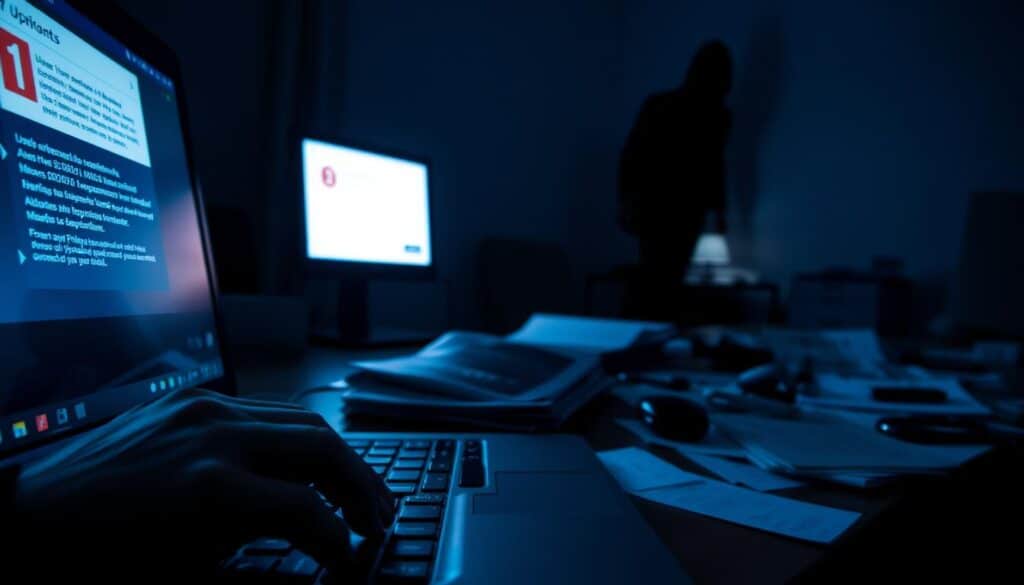Today, using online banking is more than just handy; it’s almost needed. But it’s important to remember that being able to bank online also brings risks. Keeping your money safe while you handle it online is crucial. We’ll go over some important tips to help secure your online banking.
Understanding Online Banking Security
Online banking security includes steps taken by banks and users to protect private and financial data. As digital transactions grow, it’s key to tackle online banking risks that jeopardize safety. Issues like phishing, malware, and unsafe networks show why good security practices are vital.
Anúncios
Banks must follow laws that combat money laundering and terrorism to check who their customers are. This checking boosts the safety of online dealings. Both banks and customers have important roles in keeping online banking secure. By being aware and taking action, users can greatly lower their risk.

Importance of Strong Passwords
In the online world, having strong passwords is key. They keep your accounts safe from hackers. By using tough passwords, you lessen the chance of unwanted people getting into your online bank accounts.
Creating Complex Passwords
To protect your accounts, mix it up:
- Uppercase letters
- Lowercase letters
- Numbers
- Special characters
Keep these strong passwords to yourself. Don’t share them, not even with bank staff. The trickier your password, the better it defends your personal info.
Changing Passwords Regularly
It’s very important to change your passwords often. This makes it harder for hackers to sneak into your accounts. Remember to update your passwords from time to time to keep your accounts even safer.
Safe Banking Practices
It’s vital to practice safe banking to protect your online account security. These habits boost the safety of your transactions and personal info during online banking. Always make sure to log out from your bank account after you’re done. This step keeps your sensitive details safe from unwanted access.
Logging Out After Each Session
Make sure to log out after finishing your online banking tasks. This easy step keeps your info safe, especially on devices others use too. Also, close your browser once you log out. This reduces risks from sessions that could still be open.
Using Secure Browsers and Networks
Using a secure browser is key for online account security. Choose browsers known for focusing on security and privacy. Stay away from public Wi-Fi when doing bank transactions because these networks often don’t have good encryption. Always try to use a private, encrypted connection to protect your data.
Online Banking Security Features Offered by Banks
Banks work hard to keep online banking safe. They use new bank security features to protect your money details. Features like two-step verification and secure messaging help keep your online transactions safe.
Two-Step Verification
Many banks use two-step verification for extra security. It makes you prove who you are in two ways, not just with a password. You might get a text or an app notification with a special code. This makes it harder for the wrong people to get into your account and protects your info.
Secure Message Centers
Secure messaging lets you talk to your bank safely. It’s better than regular email, which hackers can easily attack. With secure messaging, you can send important questions or requests without worrying. This builds your trust in your bank’s services and makes your banking experience better.
Protecting Your Personal Information
Keeping your personal info safe is key when banking online. Be careful not to share private details on insecure networks. Using smart steps to protect your data can really help avoid identity theft.
It’s important to know the tricks scammers use, like phishing. They pretend to be someone else to get your information. Banks fight back with strong security, like encryption, to keep your info safe.
Being aware of dangers helps you stay safe online. By being cautious, you not only protect yourself but also help secure the banking system for everyone.
Managing Suspicious Activities
It’s important to watch out for weird things happening in your accounts to keep your money safe. Checking your account often helps you catch any odd spending that wasn’t you. This way, you can quickly take care of any problems.
Reporting Unauthorized Transactions
If you see a charge you didn’t make, tell your bank right away. Banks have special teams just for dealing with fraud. Acting fast can stop more loss and keep your account safe.
Monitoring Your Accounts Regularly
Make it a habit to check your bank statements and online activities every week. Staying alert helps you spot anything odd sooner. Keep an eye out for things that don’t look right and make sure you get alerts from your bank for big transactions. Doing these things helps you feel secure.
Data Encryption and Firewalls
Online banking relies heavily on data encryption and firewalls for strong network security. Encryption technology encodes sensitive info. This ensures that only those allowed can see personal and financial details. It’s key to protect customers from data leaks and identity theft.
Firewalls stand as guards between a bank’s network and external threats. They check all incoming and outgoing traffic. This helps stop outsiders from getting into the banking systems. Thus, it helps keep online transactions safe and sound.
Banks use these high-tech methods to build trust with their customers. With top-notch encryption and strong firewalls, they boost their network’s defense. This leads to safer banking experiences for everyone.
Your Role in Online Banking Security
Banks have strong security steps, but your actions are key in keeping online banking safe. By being careful with your security, you can make digital banking much safer.
Keeping Software Up to Date
It’s important to update your software regularly. This helps close holes that cybercriminals might use. By updating your systems and apps, you protect your devices from new threats.
Not updating means bad guys could get into your online banking.
Using Anti-Virus and Anti-Malware Programs
Anti-virus and anti-malware software are critical for keeping your money safe. These tools spot and remove harmful threats and protect you in real-time. Using them with updated software helps keep your online banking secure.
Beware of Public WiFi Risks
Public Wi-Fi poses big risks to your online banking safety. These unsecured networks are everywhere: cafes, airports, and hotels. They make it easy for bad guys to grab your private info. It’s important to be extra careful on public Wi-Fi.
To keep your banking safe on public Wi-Fi, take these steps:
- Avoid doing any banking transactions.
- Use a reliable virtual private network (VPN) to encrypt your internet connection.
- Turn off sharing and don’t connect to networks you don’t know.
Resources for Enhanced Online Banking Security
Many resources are out there to make online banking safer. They offer security tips to keep personal information secure. Learning about safe online habits helps people manage their money without risks.
Services that monitor accounts are key in spotting strange activity. They quickly alert you when something seems off. By using these tools, people can fight against fraud and theft.
Banks also give out guidelines to spot scams. Using these online tools and following their advice can make banking much safer.
Conclusion
In conclusion, online banking safety is a team effort. Both banks and their customers have important roles. By making strong passwords and changing them often, people can help keep their money safe. Knowing about online dangers is key to safe online money moves.
Banks offer tools like two-step verification to lower the risk of scams and hacks. It’s important to use these features. Learning and staying aware are essential in keeping online banking safe for everyone.
By understanding and using safety tips, customers can feel more secure with their online banking. This helps build a safe online banking community. We all play a part in this.
FAQ
What is online banking security and why is it important?
How can I create a strong password for my online banking account?
What practices can enhance my online banking security?
What is two-step verification?
How can I protect my personal information while banking online?
What should I do if I notice unauthorized transactions in my account?
What role do encryption and firewalls play in online banking security?
How can I keep my devices secure for online banking?
Why should I avoid using public Wi-Fi for banking?
What resources are available for enhancing online banking security?
Content created with the help of Artificial Intelligence.



